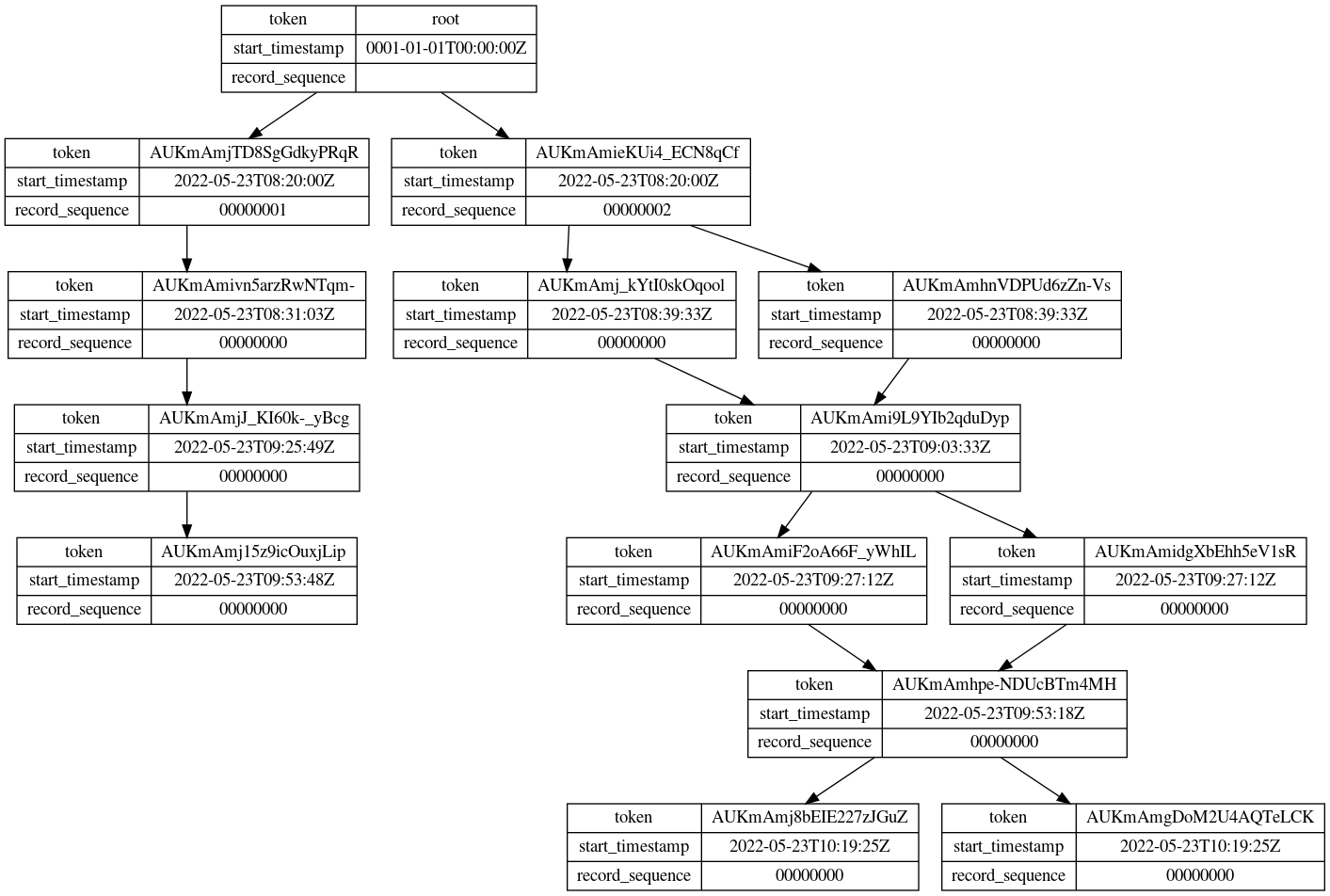A handy tool to "tail -f" Cloud Spanner Change Streams on the local machine.
Both GoogleSQL and PostgreSQL database dialects are supported.
go install github.com/cloudspannerecosystem/spanner-change-streams-tail@latest
Usage:
spanner-change-streams-tail [OPTIONS]
Options:
-p, --project= (required) GCP Project ID
-i, --instance= (required) Cloud Spanner Instance ID
-d, --database= (required) Cloud Spanner Database ID
-s, --stream= (required) Cloud Spanner Change Stream ID
-f, --format= Output format [text|json] (default: text)
--start= Start timestamp with RFC3339 format (default: current timestamp)
--end= End timestamp with RFC3339 format (default: none)
--visualize-partitions Visualize the change stream partitions in Graphviz DOT
Help Options:
-h, -help Show this help message
By default, this tool shows the Data Change record in plan text.
$ spanner-change-streams-tail -p myproject -i myinstance -d mydb -s mystream
Reading the stream...
2022-05-19 06:49:15.093823 +0000 UTC | INSERT | Players | [{"keys":{"PlayerId":"29"},"new_values":{"Name":"foo"},"old_values":{}}]
2022-05-19 06:49:20.866495 +0000 UTC | DELETE | Players | [{"keys":{"PlayerId":"29"},"new_values":{},"old_values":{"Name":"foo"}}]
2022-05-20 13:44:32.486447 +0000 UTC | UPDATE | Players | [{"keys":{"PlayerId":"23"},"new_values":{"Name":"bar"},"old_values":{"Name":"foo"}}]
...
With -f json option, you can get the results in JSON.
$ spanner-change-streams-tail -p myproject -i myinstance -d mydb -s mystream -f json
Reading the stream...
{"commit_timestamp":"2022-05-19T06:46:12.536575Z","record_sequence":"00000000","server_transaction_id":"NjQxOTE0MDE0MzM1MDQ4NTQ5NQ==","is_last_record_in_transaction_in_partition":true,"table_name":"Players","column_types":[{"name":"PlayerId","type":{"code":"INT64"},"is_primary_key":true,"ordinal_position":1},{"name":"Name","type":{"code":"STRING"},"is_primary_key":false,"ordinal_position":2}],"mods":[{"keys":{"PlayerId":"22"},"new_values":{"Name":"foo"},"old_values":{}}],"mod_type":"INSERT","value_capture_type":"OLD_AND_NEW_VALUES","number_of_records_in_transaction":1,"number_of_partitions_in_transaction":1}
{"commit_timestamp":"2022-05-19T09:45:59.480799Z","record_sequence":"00000000","server_transaction_id":"MTIwNjc4MTEyNTU3NDc1MDk5MjA=","is_last_record_in_transaction_in_partition":true,"table_name":"Players","column_types":[{"name":"PlayerId","type":{"code":"INT64"},"is_primary_key":true,"ordinal_position":1},{"name":"Name","type":{"code":"STRING"},"is_primary_key":false,"ordinal_position":2}],"mods":[{"keys":{"PlayerId":"23"},"new_values":{"Name":"bar"},"old_values":{}}],"mod_type":"INSERT","value_capture_type":"OLD_AND_NEW_VALUES","number_of_records_in_transaction":1,"number_of_partitions_in_transaction":1}
{"commit_timestamp":"2022-05-20T13:45:27.682335Z","record_sequence":"00000000","server_transaction_id":"MTE1NTE3OTU3NzM5MjEyMzkxMzI=","is_last_record_in_transaction_in_partition":true,"table_name":"Players","column_types":[{"name":"PlayerId","type":{"code":"INT64"},"is_primary_key":true,"ordinal_position":1},{"name":"Name","type":{"code":"STRING"},"is_primary_key":false,"ordinal_position":2}],"mods":[{"keys":{"PlayerId":"23"},"new_values":{"Name":"bar"},"old_values":{"Name":"foo"}}],"mod_type":"UPDATE","value_capture_type":"OLD_AND_NEW_VALUES","number_of_records_in_transaction":1,"number_of_partitions_in_transaction":1}
...
You can use jq command to modify the results.
$ spanner-change-streams-tail -p myproject -i myinstance -d mydb -s mystream -f json | jq '{ts:.commit_timestamp, type:.mod_type, table:.table_name}'
Reading the stream...
{
"ts": "2022-05-20T08:13:45.695039Z",
"type": "INSERT",
"table": "Players"
}
{
"ts": "2022-05-20T08:14:17.668655Z",
"type": "DELETE",
"table": "Players"
}
{
"ts": "2022-05-20T13:46:27.347695Z",
"type": "UPDATE",
"table": "Players"
}
...
With --start and --end options, you can specify the time boundary of the records that be read. Both options must
be RFC3339 format.
$ spanner-change-streams-tail -p myproject -i myinstance -d mydb -s mystream --start='2022-05-19T14:28:00Z' --end='2022-05-19T15:04:00Z'
Reading the stream...
2022-05-19 14:28:50.566943 +0000 UTC | INSERT | Players | [{"keys":{"PlayerId":"29"},"new_values":{"Name":"foo"},"old_values":{}}]
2022-05-19 15:03:07.866495 +0000 UTC | DELETE | Players | [{"keys":{"PlayerId":"29"},"new_values":{},"old_values":{"Name":"foo"}}]
2022-05-19 15:03:28.907391 +0000 UTC | UPDATE | Players | [{"keys":{"PlayerId":"20"},"new_values":{"Name":"abc"},"old_values":{"Name":"foo"}}]
With -v, --verbose option, you can get the Heartbeat and Child Partitions records as well. Also, each result includes
the partition_token that associates with the change record.
$ spanner-change-streams-tail -p myproject -i myinstance -d mydb -s mystream --verbose
Reading the stream...
{"partition_token":"","change_record":[{"data_change_record":[],"heartbeat_record":[],"child_partitions_record":[{"start_timestamp":"2022-05-20T08:23:10.12375Z","record_sequence":"00000001","child_partitions":[{"token":"AUKmAmgw5S0xbORt3X6EPHBTEXRL5H7VVRh1T7I0xeX_M04SnhhFYBOjQuQZ3AHCh6jGc3gsxAqOHRMHyinqts18NY-JY7Ym5fvSoAGouuSmH6Gff1LspwazfdBRY8_G1enbeBuQNa8b1AEG_KsuhFJCdsr6_Q","parent_partition_tokens":[]}]}]}]}
{"partition_token":"","change_record":[{"data_change_record":[],"heartbeat_record":[],"child_partitions_record":[{"start_timestamp":"2022-05-20T08:23:10.12375Z","record_sequence":"00000002","child_partitions":[{"token":"AUKmAmi65l6TU-0EGTTAj9zLPBU_aJJ1Jsy3JLIkWIH-SSb_nXfTb6X4CLmTQFSkZj-QL_NiGi3p0jGZNQZ8C1WF01GkgvIQ7Qaf4XFxVqSBgPuXBzdpLiye58fmj_Dz2lnV_LYTtPgQcdvOUGJU","parent_partition_tokens":[]}]}]}]}
{"partition_token":"AUKmAmgw5S0xbORt3X6EPHBTEXRL5H7VVRh1T7I0xeX_M04SnhhFYBOjQuQZ3AHCh6jGc3gsxAqOHRMHyinqts18NY-JY7Ym5fvSoAGouuSmH6Gff1LspwazfdBRY8_G1enbeBuQNa8b1AEG_KsuhFJCdsr6_Q","change_record":[{"data_change_record":[],"heartbeat_record":[{"timestamp":"2022-05-20T08:23:20.123938Z"}],"child_partitions_record":[]}]}
{"partition_token":"AUKmAmi65l6TU-0EGTTAj9zLPBU_aJJ1Jsy3JLIkWIH-SSb_nXfTb6X4CLmTQFSkZj-QL_NiGi3p0jGZNQZ8C1WF01GkgvIQ7Qaf4XFxVqSBgPuXBzdpLiye58fmj_Dz2lnV_LYTtPgQcdvOUGJU","change_record":[{"data_change_record":[],"heartbeat_record":[{"timestamp":"2022-05-20T08:23:20.123904Z"}],"child_partitions_record":[]}]}
...
With --visualize-partitions option, you can get the visualized partitions in Graphviz DOT format. You also need to
specify --start and --end options to specify the time bound for visualization.
$ spanner-change-streams-tail -p myproject -i myinstance -d mydb -s mystream --start="2022-05-23T17:20:00+09:00" --end="2022-05-23T19:20:00+09:00" --visualize-partitions
Reading the stream and analyzing partitions...
digraph {
node [shape=record];
"AUKmAmidgXbEhh5eV1sR" [label="{token|start_timestamp|record_sequence}|{{AUKmAmidgXbEhh5eV1sR}|{2022-05-23T09:27:12Z}|{00000000}}"];
"AUKmAmi9L9YIb2qduDyp" [label="{token|start_timestamp|record_sequence}|{{AUKmAmi9L9YIb2qduDyp}|{2022-05-23T09:03:33Z}|{00000000}}"];
"AUKmAmj15z9icOuxjLip" [label="{token|start_timestamp|record_sequence}|{{AUKmAmj15z9icOuxjLip}|{2022-05-23T09:53:48Z}|{00000000}}"];
"AUKmAmjTD8SgGdkyPRqR" [label="{token|start_timestamp|record_sequence}|{{AUKmAmjTD8SgGdkyPRqR}|{2022-05-23T08:20:00Z}|{00000001}}"];
"AUKmAmjJ_KI60k-_yBcg" [label="{token|start_timestamp|record_sequence}|{{AUKmAmjJ_KI60k-_yBcg}|{2022-05-23T09:25:49Z}|{00000000}}"];
"AUKmAmhpe-NDUcBTm4MH" [label="{token|start_timestamp|record_sequence}|{{AUKmAmhpe-NDUcBTm4MH}|{2022-05-23T09:53:18Z}|{00000000}}"];
"AUKmAmj8bEIE227zJGuZ" [label="{token|start_timestamp|record_sequence}|{{AUKmAmj8bEIE227zJGuZ}|{2022-05-23T10:19:25Z}|{00000000}}"];
"AUKmAmgDoM2U4AQTeLCK" [label="{token|start_timestamp|record_sequence}|{{AUKmAmgDoM2U4AQTeLCK}|{2022-05-23T10:19:25Z}|{00000000}}"];
"root" [label="{token|start_timestamp|record_sequence}|{{root}|{0001-01-01T00:00:00Z}|{}}"];
"AUKmAmj_kYtI0skOqool" [label="{token|start_timestamp|record_sequence}|{{AUKmAmj_kYtI0skOqool}|{2022-05-23T08:39:33Z}|{00000000}}"];
"AUKmAmhnVDPUd6zZn-Vs" [label="{token|start_timestamp|record_sequence}|{{AUKmAmhnVDPUd6zZn-Vs}|{2022-05-23T08:39:33Z}|{00000000}}"];
"AUKmAmiF2oA66F_yWhIL" [label="{token|start_timestamp|record_sequence}|{{AUKmAmiF2oA66F_yWhIL}|{2022-05-23T09:27:12Z}|{00000000}}"];
"AUKmAmieKUi4_ECN8qCf" [label="{token|start_timestamp|record_sequence}|{{AUKmAmieKUi4_ECN8qCf}|{2022-05-23T08:20:00Z}|{00000002}}"];
"AUKmAmivn5arzRwNTqm-" [label="{token|start_timestamp|record_sequence}|{{AUKmAmivn5arzRwNTqm-}|{2022-05-23T08:31:03Z}|{00000000}}"];
"root" -> "AUKmAmieKUi4_ECN8qCf"
"AUKmAmjTD8SgGdkyPRqR" -> "AUKmAmivn5arzRwNTqm-"
"AUKmAmieKUi4_ECN8qCf" -> "AUKmAmhnVDPUd6zZn-Vs"
"AUKmAmi9L9YIb2qduDyp" -> "AUKmAmiF2oA66F_yWhIL"
"AUKmAmi9L9YIb2qduDyp" -> "AUKmAmidgXbEhh5eV1sR"
"root" -> "AUKmAmjTD8SgGdkyPRqR"
"AUKmAmivn5arzRwNTqm-" -> "AUKmAmjJ_KI60k-_yBcg"
"AUKmAmj_kYtI0skOqool" -> "AUKmAmi9L9YIb2qduDyp"
"AUKmAmhnVDPUd6zZn-Vs" -> "AUKmAmi9L9YIb2qduDyp"
"AUKmAmjJ_KI60k-_yBcg" -> "AUKmAmj15z9icOuxjLip"
"AUKmAmhpe-NDUcBTm4MH" -> "AUKmAmgDoM2U4AQTeLCK"
"AUKmAmieKUi4_ECN8qCf" -> "AUKmAmj_kYtI0skOqool"
"AUKmAmiF2oA66F_yWhIL" -> "AUKmAmhpe-NDUcBTm4MH"
"AUKmAmidgXbEhh5eV1sR" -> "AUKmAmhpe-NDUcBTm4MH"
"AUKmAmhpe-NDUcBTm4MH" -> "AUKmAmj8bEIE227zJGuZ"
}
This repository also has changestreams package that can be used as a Go library to read the change streams from your
Go application. You can get more details from
the Godoc.
Note that changestreams package has limited scalability. If you need more scalable, reliable solution, you can use an
official Dataflow connector.
Please feel free to report issues and send pull requests, but note that this application is not officially supported as part of the Cloud Spanner product.
